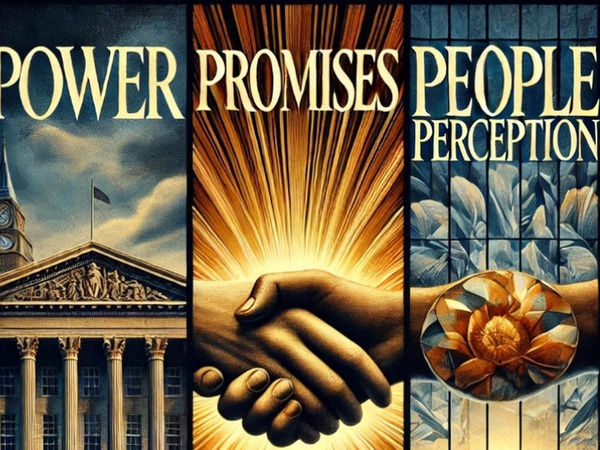<p> Power, Promises, and Public Perception.</p><p><br></p><p>Politics, at first glance, is the machinery by which societies are governed—a system built to represent the interests of the people, maintain order, and foster collective progress. But beyond the official definitions and ceremonial rituals lies a far more complex, and often disheartening, truth. Politics is not merely the art of governance; it is a tangled web of power struggles, crafted promises, and the ever-shifting tides of public perception. It is a stage where ideals often clash with ambition, where truth is flexible, and where the line between service and self-interest is perpetually blurred.</p><p><br></p><p>At the heart of politics is power. It is the silent engine that drives most political decisions, alliances, betrayals, and strategies. Power is the currency more coveted than money, more addictive than fame. It is what transforms ordinary individuals into leaders, and sometimes, what corrupts them. The desire for power can begin with noble intentions—the wish to change lives, to rewrite a broken narrative, to stand up for the voiceless. But too often, once power is attained, the original purpose fades into the background, replaced by the struggle to retain it. Because power, once tasted, is rarely surrendered willingly. It comes with privilege, influence, and the ability to shape reality to one’s will, even at the expense of truth.</p><p><br></p><p>In the quest for power, promises become tools—carefully sculpted words designed to win hearts, stir hope, and secure votes. Promises are the currency of campaigns, the sweetened offerings of a better tomorrow. They are painted with the brush of empathy, often reflecting the dreams and needs of the public. But once elections are won, these promises often fall into two categories: the conveniently forgotten and the indefinitely postponed. The reality is that politics thrives on short-term memory. The promises made with passion on podiums are easily diluted by the bureaucracy of governance or replaced by more politically expedient agendas. In the end, promises in politics are not always about delivery—they are about persuasion. They are the means to an end, not the end itself.</p><p><br></p><p>Yet, politics would hold no power if not for the people. Public perception is the third pillar that upholds the political structure. It is both the weapon and the weakness of politicians. No matter how strategic or ruthless a leader might be, their survival in the political arena depends on how they are seen. It is why image management has become a central part of modern governance. It’s no longer enough to lead; one must appear to lead. Politicians invest heavily in narratives—crafted speeches, photo ops, carefully controlled media appearances, and calculated gestures of concern. A single misstep, gone viral, can shatter years of carefully built credibility. Conversely, a well-timed stunt, even if hollow, can transform a failing leader into a hero in the public eye.</p><p><br></p><p>What makes public perception even more volatile is its dependence on emotion over evidence. People vote not just with facts, but with feelings—with fear, with hope, with nostalgia, with frustration. Politics has become less about policy and more about performance. Leaders are judged not by the depth of their plans but by how well they resonate with the public mood. This opens the door to manipulation. When perception becomes more powerful than substance, truth becomes a matter of opinion, and the most charismatic voice often drowns out the most competent one.</p><p><br></p><p>The tragedy of modern politics is that the system often rewards those who master the game, not those who serve the people. It favors optics over outcomes, alliances over accountability, and loyalty over merit. Sincere leaders find themselves overwhelmed by political machinery designed to maintain status quo. They are outnumbered, out-funded, and often silenced. The ones who thrive are those who understand the unspoken rules—the power of appearances, the utility of selective promises, and the skill of navigating perception like a chessboard.</p><p><br></p><p>And yet, the people are not without power. Public perception, though manipulable, can also be awakened. History has shown that when citizens become more informed, more questioning, and less easily distracted by theatrics, politics begins to shift. True change comes not just from voting, but from sustained civic engagement, from holding leaders accountable long after the ballots have been cast. It comes from demanding substance over showmanship and refusing to accept broken promises as tradition.</p><p><br></p><p>In the end, politics reflects society’s values and weaknesses. It is a mirror, sometimes distorted, of what we collectively tolerate, believe, and prioritize. To understand the reality of politics is not to grow cynical, but to grow wiser. It is to recognize the seduction of power, the frailty of promises, and the malleability of perception—and to navigate all three with discernment. Only then can politics be reclaimed as a force for good, and not just a theatre of ambition.</p>


Comments